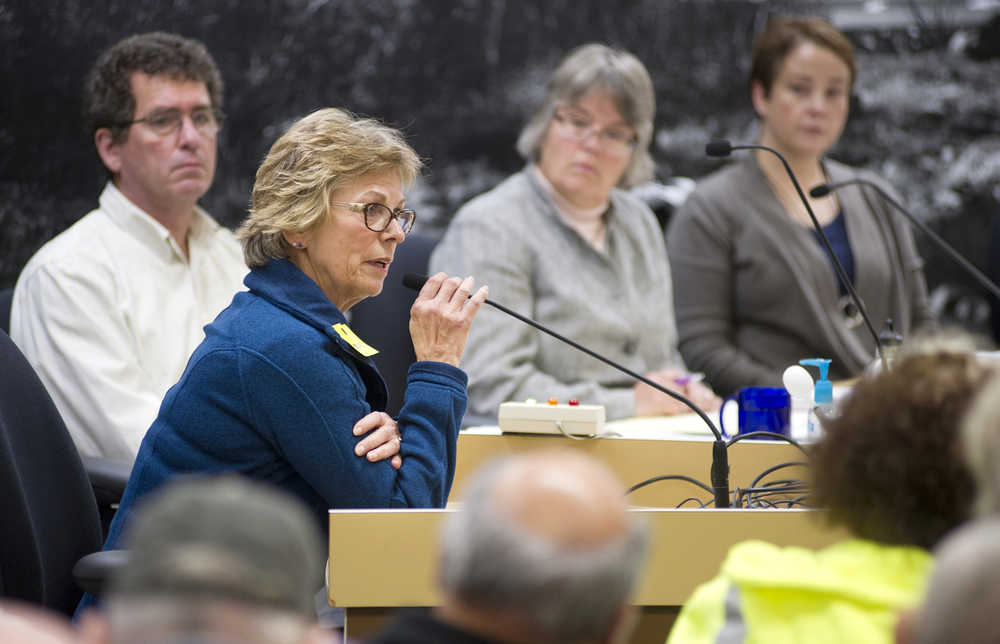The City and Borough of Juneau Assembly passed an ordinance restricting the senior sales tax exemption during a meeting Monday night, despite nearly two hours of testimony from seniors, many of whom opposed the measure.
The silver tsunami hit City Hall in full force as seniors packed the Assembly Chambers and tried to convince Assembly members to scrap the proposed changes to the tax exemption, which will limit the exemption to essential purchases for most seniors and introduce a needs-based rebate program.
About 100 seniors attended the meeting. Many had to listen to the meeting being broadcast live on the radio in an adjacent overflow room because fire code prevented all of the attendees from being able to gather in the chambers. Mayor Merrill Sanford had to limit public participation to two minutes per person due to the amount of seniors who wanted to testify.
Nearly 40 people spoke during the marathon public comment period, most of whom voiced opposition.
“There are things that draw people to Juneau and things that push them away,” said Frieda Westman, grand president of the Alaska Native Sisterhood.
The message from most of the speakers was clear: changing the senior sales tax exemption would push people away. More than a dozen seniors threatened to leave the city if the Assembly passed the ordinance, and many also threatened to stop donating and volunteering.
Other people who spoke out against the ordinance proposed putting the ordinance to a vote or cutting other costs to save the tax exemption.
“If you want this to have some impact and some meaning you need to bring this to a public vote,” said John Cooper, speaking to the Assembly. “Just because there are kids in this community doesn’t mean that I should pay for their ball fields and their skiing.”
Cooper’s brief testimony elicited cheers from the packed chambers and a stern response from Sanford who requested that people remain quiet to speed the meeting along.
Not all of the people who spoke opposed restricting the senior sales tax, and not all of the speakers were seniors. About a fifth of those who spoke supported the proposed changes to the exemption.
Arnold Liebelt spoke on behalf of the ordinance, saying that it is about more than just seniors although he recognized that they would be most heavily impacted by it.
“I see this as a community issue, I don’t see this as a senior issue,” Liebelt said. “The working class is strapped, and there has to be a community solution. There’s no silver bullet. This is just one piece.”
Assembly member Karen Crane echoed Liebelt’s point later in the meeting before motioning to adopt the ordinance.
“We have tried to be as fair as possible,” Crane said. “It’s not just about seniors. It’s about young families, too.”
The motion passed 7-2. The only Assembly members to oppose Crane’s motion were Mary Becker and Mayor Sanford.
“I think it’s very unfair, and I think it’s putting a tax on one group of people,” Becker said.
Beginning Jan. 1, 2016, the sales tax exemption will be limited to “essential purchases” only.
These include food, heating fuel, electricity and CBJ water and wastewater utilities.
The ordinance was amended by Assembly member Debbie White to include garbage utilities as an “essential purchase,” so these utilities will remain tax free for all seniors as well.
The restrictions will only be applicable to seniors making more than two and a half times the federal poverty level. Seniors living on an income less than that will continue to benefit from the tax exemption, albeit in a slightly different way.
All seniors will be required to pay sales tax at the point of sale on any nonessential items beginning on the first of next year, but a senior couple making less than $49,800 per year will be eligible for a tax rebate calculated based on income.
Rebates will be awarded annually in September. The maximum rebate for a single senior will be $325. For a married couple, it will be $650.

